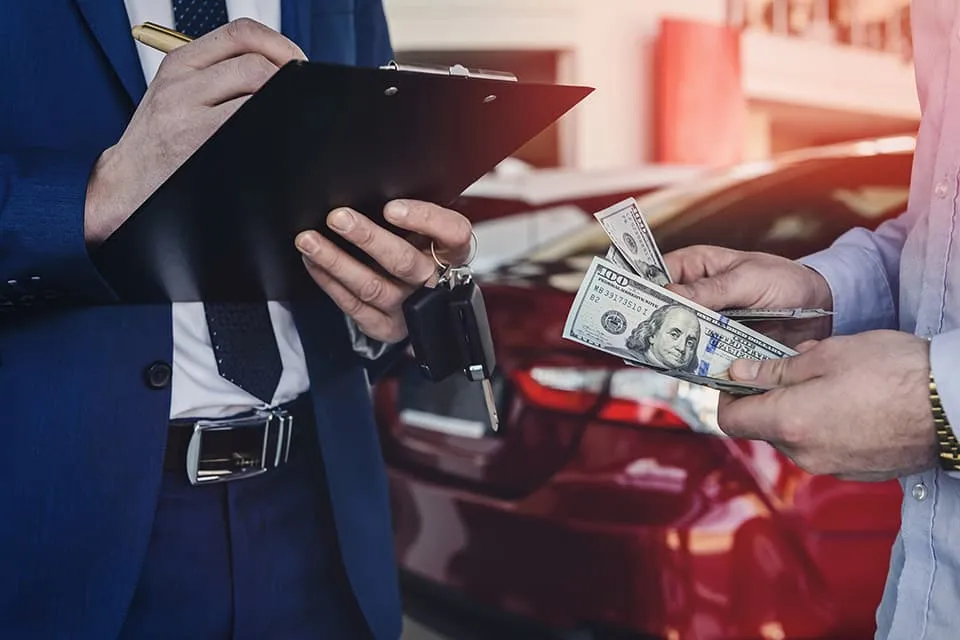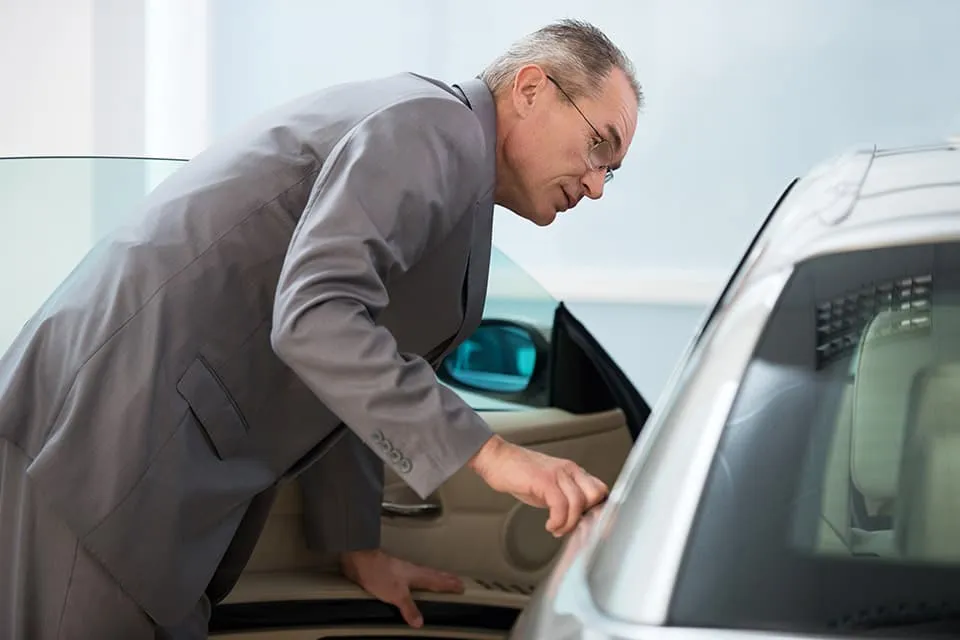What Is a Manufacturer BuyBack?

For a vehicle to qualify as a buyback it must be repurchased by the same manufacturer that originally sold it. There are three main reasons why a manufacturer would buy back a vehicle.
- There were issues within the vehicle that were unresolved and subsequently reported by the vehicle purchaser.
- The customer is dissatisfied with the vehicle and wants to return it, claiming it's defective (even if it isn't.)
- The manufacturer can not get a certain repair part within a reasonable time and the customer wants the car to be repurchased.
If the vehicle has no defects, the car is inspected and given a manufacturer buyback title and sold as a buyback vehicle. If the car is defective it is repaired by the manufacturer and also sold as a buyback car. There are several factors that influence whether a vehicle becomes a buyback, and a couple of common misconceptions surrounding these cars.
How Does a Manufacturer Buyback Work?
A manufacturer buyback operates through a process where vehicles are repurchased due to undisclosed defects or extensive customer dissatisfaction. These repurchased vehicles, labeled with a manufacturer buyback title, serve as a cautionary signal to potential buyers regarding their history. However, not all buyback cars stem from defects; some result from financial constraints or buyer's remorse.
For a manufacturer buyback to occur, a vehicle must first be sold to a consumer. Subsequently, the consumer may identify a defect or exploit loopholes to prompt repurchase. Manufacturers, keen on maintaining positive customer relations, often opt to repurchase the vehicle rather than engage in contentious disputes. Following repurchase, a thorough inspection determines the vehicle's condition. If no significant issues are found (often due to misrepresentation by the original buyer), the manufacturer rebrands the title and sells the vehicle as a buyback. Alternatively, if repairs are necessary, the vehicle undergoes restoration before being made available for purchase at a reduced price to a new customer.
Are Buyback Cars Safe?

Despite the risk of defects, buying a buyback car can often be a wise financial decision. There is a good chance that the vehicle never had any issues to begin with, and the original buyer simply exploited the manufacturer's goodwill to get out of an unaffordable car loan. These people will also often utilize their state's Lemon car laws to force a manufacturer to purchase the car. Either way, you are getting a vehicle that has no defects for a much more affordable price.
If the car does end up having defects, that shouldn't worry you either. The legal requirements regarding car buy backs mean any car with a manufacturer buyback title has to be repaired and pass certain inspection guidelines to be sold. While you should still do your research, a buyback car is almost always safe to drive.
Should I Buy a Manufacturer Buyback Vehicle?

While the word "defects" may give some people pause, the point of a manufacturer buyback is to repair the vehicle so it can be resold. Some of these vehicles did not have any issues anyway, and were purchased as a courtesy to satisfy an unruly customer.
Even if there are issues with the vehicle, a car manufacturer has a lot more to lose by selling you a defective car than a private citizen would. Manufacturers are also legally required to repair any issues the vehicle has before they can get a manufacturer buyback title for the vehicle.
That being said, you should be a bit more strict in your fact finding when it comes to a buyback vehicle. Make sure to insist on a test drive and comprehensive vehicle inspection before purchase. Listen for unusual noises, non functioning systems, or any other form of damage that may indicate the car hasn't been fully repaired.
There are thousands of dealerships for each manufacturer in the United States, and not all of them are held to the same standard. As always with car buying, being vigilant can save you time and money. If you believe a vehicle isn't being properly represented or you see signs that the sale may be a part of a scam, don't hesitate to back out and find another way to purchase your car. There are always more dealerships or private citizens to purchase from and your instincts could prevent you from being victimized.
Car Buyback Frequently Asked Questions
What Is a Manufacturer Buyback Vehicle?
A manufacturer buyback vehicle is a car that has been bought by a manufacturer back from a car buyer due to defects or dissatisfaction. They then fix the car if it needs repairs and sell the vehicle for a lower price.
Why Would a Manufacturer Buy a Vehicle Back?
There are three main reasons why a manufacturer would make a car buy back:
- The manufacturer is showing goodwill to a customer who has expressed dissatisfaction with their vehicle purchase. Even if these customers have no evidence of any tangible issues within the car, manufacturers will still buy the car back to keep the customer happy and avoid damaging their brand reputation.
- There is a legitimate issue or defect within the car that the manufacturer was either not aware of or could not be fixed. The customer can take the vehicle back in for inspection, citing the defect. Once the issue is found, the manufacturer will purchase the vehicle to sell as a buyback car.
- If there is an issue with the vehicle the customer wants to fix, dealerships will have to order the parts for repair. Sometimes these parts can take weeks, or in the case of supply chain issues even months, to arrive at the dealership. If the customer does not like the timeline presented by the manufacturer, they can request they buy the car back.
How Much Does a Manufacturer Buyback Vehicle Cost?
It's up to each manufacturer to determine how much they will reduce the cost of a vehicle they buy back. Buyback car cost will usually be defined by how much of the car needs to be repaired; if the defective part is a central component to the car's function, the vehicle may only see a slight reduction in price. Labor costs also play a factor in the repricing of the vehicle, and higher end manufacturers may need to compensate their technicians with higher salaries.
While there is no real overall average, consumers have reported the discount for a buyback car being as much as 30-40% or as little as a couple hundred dollars. Talk to your local dealership to see what pieces they offer, and don't be afraid to shop around once you have a quote.
What Is a Manufacturer Buyback Title?
A manufacturer buyback title is a form of branded car title that shows a consumer whether a vehicle has been repurchased by a manufacturer. This allows the car buyer to make a more informed purchase decision and decide whether the vehicle functions properly. It's always best to show a little hesitancy when purchasing a car with a manufacturer buyback title; make sure to test drive the vehicle and get it fully inspected before purchase.
What Is a Vehicle Buy Back Program?
A vehicle buy back program is an initiative created by dealerships to encourage car owners to trade in or sell their vehicles to a dealership. They also help convince new car buyers that their purchase is a safe investment, as the buyback program offers them an easy way to return the vehicle if they are dissatisfied.
What Is The California Buy Back Car Program?
The California buy back car program is a way for citizens of California to retire their vehicles if they no longer have a need for them. They usually offer between $1000 and $1500 to participants, and the vehicles must pass several requirements including a smog check, tamper check, and engine check. The vehicles almost must have current registration and the title must be in the participant's name.
What Is a Manufacturer Buyback Car's Value?
A manufacturer buyback car's value is determined by the manufacturer and dealership and can range based on their specific process of inspection and repair.
Where Can I Get More Information
About Manufacturer Buyback Cars?
Finding out whether a vehicle has a manufacturer buyback title is an important step in researching a car purchase. There are a variety of other details you'll want to know before considering buying a car, and you'll want to take the time to do proper due diligence before making a financial decision. The best way to get more information about a vehicle is by using a vehicle history search tool.
These tools can help you find out essential facts and figures pertaining to your car, like the car's VIN and license plate number. That way you can use what you've found to conduct a comprehensive car history report and determine whether the car is right for you. By taking the time to prepare yourself before a purchase, you can avoid overpaying for a vehicle or being the victim of a scam.
FREE Vehicle Search
- Accidents
- Problem Checks
- Title Records
- Recalls
- Values
- Specs
-
InfoPay, Inc. (dba GoodCar) is an Approved NMVTIS Data Provider
-
-






























